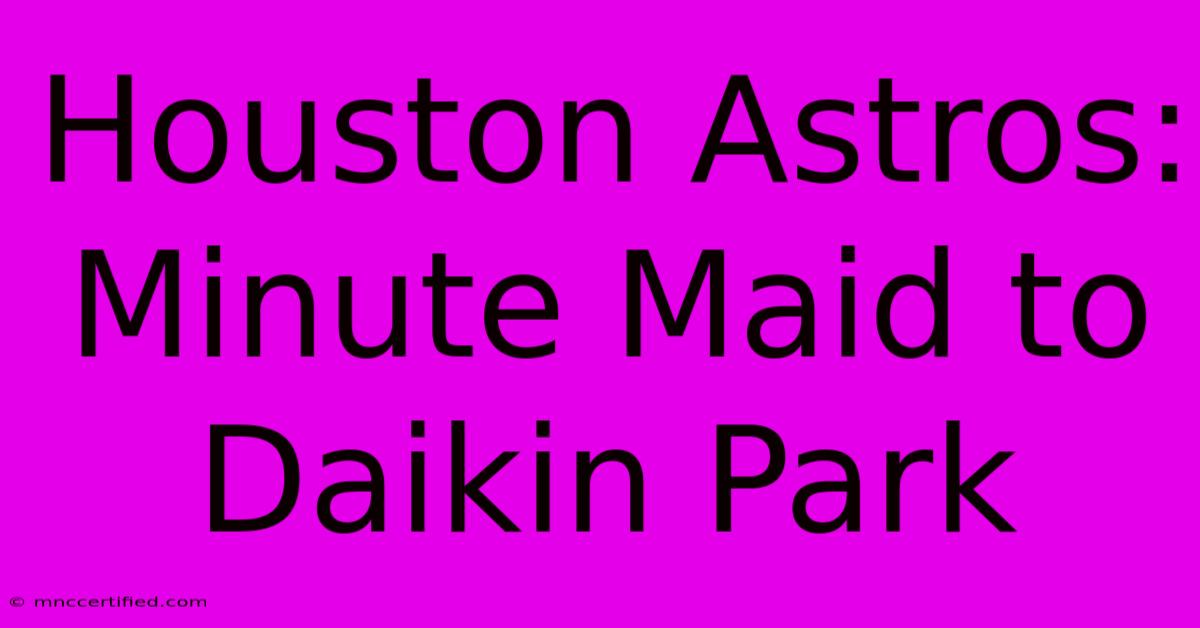Houston Astros: Minute Maid To Daikin Park

Table of Contents
Houston Astros: From Minute Maid Park to a Potential New Home? The Daikin Field Debate
The Houston Astros, reigning World Series champions, have called Minute Maid Park home since 2000. But whispers of a potential new stadium are circulating, sparking debate among fans and city officials. While the iconic ballpark holds a special place in Astros history, discussions surrounding a possible move to a new location, sometimes referred to as "Daikin Field" (though not officially named), are gaining traction. This article delves into the arguments for and against a new stadium, exploring the potential benefits and drawbacks for the team, the city, and its passionate fans.
The Case for a New Stadium: Beyond Minute Maid Park
Proponents of a new Astros stadium often point to several key factors:
Modern Amenities and Fan Experience:
Minute Maid Park, while charming, shows its age. A new stadium could boast modern amenities, improved fan experience, and enhanced technology integration. Think upgraded concessions, easier navigation, more comfortable seating, and state-of-the-art sound and lighting systems. This could significantly enhance game-day enjoyment for fans, leading to increased attendance and revenue for the team.
Revenue Generation and Economic Impact:
A new stadium often attracts private investment, potentially leading to significant economic benefits for the city. This could include new businesses, job creation, and increased tourism. Furthermore, a modern stadium with premium seating options and luxury suites can generate higher revenue streams for the Astros, allowing for further investments in the team and player development.
Location and Accessibility:
The current location of Minute Maid Park, while centrally located, presents challenges regarding parking and accessibility. A new stadium in a more strategically planned location could offer improved transportation options, including public transit and ample parking, enhancing the overall fan experience.
The Case Against a New Stadium: Preserving History and Tradition
While the allure of a modern stadium is undeniable, opponents raise valid concerns:
Cost and Public Funding:
The construction of a new stadium is enormously expensive. The potential use of public funds raises questions of accountability and the allocation of resources. Critics argue that these funds could be better spent on other vital city infrastructure projects, such as improving schools or public transportation.
Environmental Impact:
The construction of a new stadium inevitably involves a significant environmental impact. Concerns about carbon emissions, waste management, and land use need careful consideration and mitigation strategies. A sustainable building design is crucial to minimize the ecological footprint.
Sentimental Value of Minute Maid Park:
Minute Maid Park is more than just a ballpark; it's a historic landmark and a symbol of the city's baseball legacy. For many Astros fans, it holds significant sentimental value, representing cherished memories and iconic moments in team history. Relocating would mean losing a part of that rich heritage.
The Daikin Factor: A Speculative Future
The potential involvement of Daikin Industries in a new stadium project adds another layer to the discussion. While details remain scarce, the potential sponsorship presents both opportunities and challenges. While a corporate partnership could provide substantial funding, it also raises concerns about branding and potential conflicts of interest.
Conclusion: A Balancing Act
The decision of whether to build a new stadium for the Houston Astros is a complex one, requiring careful consideration of various factors. Weighing the potential benefits of a modern facility against the costs and potential drawbacks is essential. Open dialogue involving city officials, team management, and most importantly, the passionate Houston Astros fanbase, is crucial to finding a solution that best serves the interests of the team and the city. Only time will tell if the Astros will indeed move from Minute Maid Park to a new chapter in their history. The debate continues.

Thank you for visiting our website wich cover about Houston Astros: Minute Maid To Daikin Park. We hope the information provided has been useful to you. Feel free to contact us if you have any questions or need further assistance. See you next time and dont miss to bookmark.
Featured Posts
-
Apollo Car Insurance Phone Number
Nov 19, 2024
-
Mewis And Kerr Expect First Child
Nov 19, 2024
-
Super Micro Stock A Positive Uptick
Nov 19, 2024
-
Trump Dance Explained Viral Phenomenon
Nov 19, 2024
-
Does Boat Insurance Cover Sinking
Nov 19, 2024